
 In all democratic societies, the public are encouraged to vote in order to have a say in how their government is run. But do all votes count equally? Looking at how representatives vote, and if this represents the preferences of their constituents, John Griffin and Brian Newman find that high income earners and whites have far greater levels of ‘voting power’ than low income earners and African Americans. Since incumbents have little incentive to appeal to non-voters and those who have little voting power, the authors find that African Americans who vote are no better off than African Americans who don’t. If citizens increasingly perceive these inequalities, then this may be a further disincentive for them to vote, leading to questions of democratic legitimacy.
In all democratic societies, the public are encouraged to vote in order to have a say in how their government is run. But do all votes count equally? Looking at how representatives vote, and if this represents the preferences of their constituents, John Griffin and Brian Newman find that high income earners and whites have far greater levels of ‘voting power’ than low income earners and African Americans. Since incumbents have little incentive to appeal to non-voters and those who have little voting power, the authors find that African Americans who vote are no better off than African Americans who don’t. If citizens increasingly perceive these inequalities, then this may be a further disincentive for them to vote, leading to questions of democratic legitimacy.
The American political scientist Walter Dean Burnham once argued “if you don’t vote, you don’t count.” It’s true—voters tend to be better represented politically than nonvoters (in the sense that elected officials more often pursue voters’ preferred policies). What is less obvious is that the rewards of voting are unequal. The incentives facing elected officials in the U.S. push those officials to reward the votes of high income earners and whites more than the votes of low income earners and African Americans. For some, even if you vote, you still don’t count much.
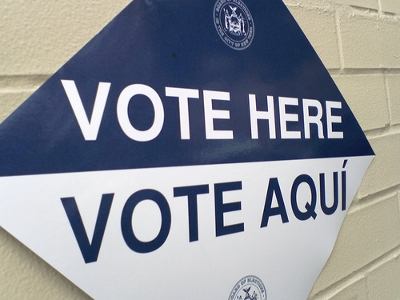
The recent ‘occupy’ movement had at least one thing right—the social science record shows that wealthy Americans are more likely than the less wealthy to get what they want from government (see, e.g., Gilens, Bartels, Hacker and Pierson, and Page). White Americans are also better represented than African Americans and Latinos. Figure 1 summarizes this research. It shows various groups’ average “win ratios,” or the percentage of roll call votes cast in the U.S. House of Representatives in which a citizen’s representative voted the way the citizen preferred (for the statistically minded, we include 95% confidence intervals). By this measure of representation, it is clear that whites enjoy more political victories than African Americans and victories increase with income (we split the public into three income groups of roughly equal size).
Figure 1: Voters’ “win ratios” and Unequal Policy Representation in the U.S.
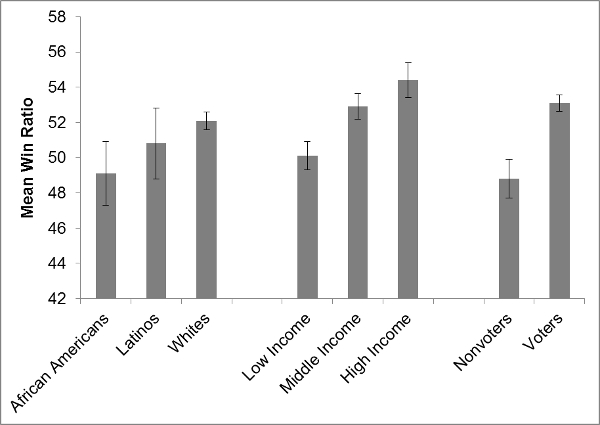
Data: 2004 National Annenberg Election Survey
Note: Brackets indicate the 95% confidence interval.
Figure 1 also shows that voters win more often than do non-voters. However, elected officials have incentives to reward some voters more than others. Incumbents know that if they act inconsistent with their constituents’ wishes, voting constituents may punish them on election day. But, not every constituent has the same power to punish or reward because some voters have more influence on the next election’s outcome. Specifically, ‘swing voters,’ those who could be persuaded to vote for or against the incumbent, receive disproportionate attention from calculating politicians. These voters are especially important to incumbents because swing voters who are not won over will likely vote for the opponent, while the dissatisfied among the base will probably just stay home. Finally, all else equal, incumbents have an incentive to appeal to larger groups of likely voters (usually whites and those earning at least moderate incomes).
Borrowing a concept from Larry Bartels (see chapter 3) and data from the 2004 National Annenberg Election Survey we calculated each citizen’s “voting power,” based on their probability of turning out to vote, the extent to which they are a swing voter, and the size of their racial/minority or income group in their congressional district. Those with higher voting power will be more important to an incumbent’s reelection effort. Figure 2 shows the disparity among groups’ average voting power. Although the raw numbers don’t have a meaningful metric, the figure makes clear that whites have more voting power, mostly because over 90 per cent of African Americans tend to vote for Democratic candidates (i.e. they are not swing voters). In addition, middle and high income earners have more voting power, partly because low income earners are a bit more reliably Democratic than the others and partly because middle and high income earners vote at modestly higher rates.
Figure 2: Average Voting Power for Groups
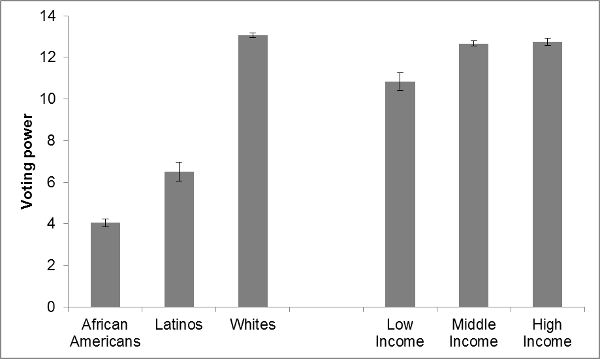
Data: 2004 National Annenberg Election Survey
Figure 2 has bold implications: most congressional incumbents in the U.S. have incentives to dole out whatever resources they have, including their roll call votes, disproportionately to whites and middle and high income earners. In fact, using roll call data from the 109th Congress (2005-2007) we found that those with higher voting power tend to be better represented. Citizens at the 75th percentile of voting power had a ‘win ratio’ about 5 points higher than citizens at the 25th percentile.
Figure 2 also holds a more subtle implication: among groups whose votes are less valued (i.e., low income earners and African Americans), the ‘rewards of voting’ are smaller. This is because incumbents have little incentive to appeal to nonvoters, regardless of their demographic group. They also have limited incentive to appeal to groups with little voting power, but strong incentive to appeal to voters in high voting power groups. This means we should expect a big gap in the treatment of voters and non-voters in high voting power groups, but not much of a gap for low voting power groups.
Figure 3: Differences in Win Ratios of Voters and Non-Voters
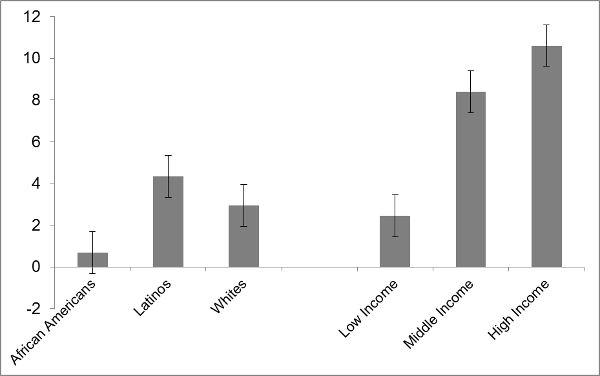
Data: 2004 National Annenberg Election Survey
This is precisely what we find in Figure 3, which shows the difference in the mean ‘win ratio’ of voters and non-voters in the groups we study. On average, white voters enjoy win ratios about 3 points higher than white non-voters, while Latino voters have win ratios about 4 points higher than Latino non-voters. In stark contrast, African Americans who vote are no better off than African Americans who do not vote. In terms of income groups, low income voters are slightly better off than low income non-voters, with win ratios about 2 points higher. In contrast, voters among the middle-income group enjoy win ratios about 8.5 points higher than non-voters. For the high income group, the difference is 10 points. As a point of comparison, we found that, on average, a Republican constituent with a Republican member of the House has a win ratio 15 points higher than a Republican represented by a Democrat in the House. Thus, the ‘rewards of voting’ for middle and high income earners is over half as large as the effect of being able to choose the party of one’s representative.
Note that our findings do not imply that government officials are racist or classist (consciously or subconsciously). Although some may be, the electoral incentives facing incumbent officials push them to act in ways that advantage whites and the wealthy. Simply replacing current incumbents with a fresh batch of more enlightened representatives will make little difference unless underlying patterns of party voting and levels of political activity shift.
Not only are political inequalities apparently persistent, they may increase in the future. Voters may sense the inequalities in who elected officials represent and the unequal rewards of voting. Citizens who feel that the system doesn’t work for them and that voting provides few rewards may decide not to vote. Preliminary evidence suggests that African Americans and low income earners do sense their limited rewards from voting. If a sizeable portion of politically active African Americans and low income earners drop out of politics altogether, not only will their groups lose even more voting power, the democratic system may lose some of its legitimacy. Moreover, turning out the vote has long been a chief strategy for disadvantaged groups to gain political power. If voting brings few rewards to groups with limited voting power, mobilization efforts may provide only a limited avenue for these groups to level the degree of political clout among the American public.
At this point, we have not seen evidence suggesting that these inequalities will inevitably increase. Conditions can change. In 2008 and 2012, for the first time African Americans voted at higher rates than whites, meaning African Americans’ voting power is on the rise relative to whites. Groups currently beholden to one party might become more persuadable and thus increase their voting power. Although it is hard to imagine many African Americans defecting to the Republican Party, it is a rare day that the American media does not discuss the Republicans’ efforts to woo Latino voters away from the Democratic fold. The patterns we see here are not immutable. However, the electoral logic behind them seems quite stable and may generate further political inequalities far into the future.
This article is based on the paper “Voting Power, Policy Representation, and Disparities in Voting’s Rewards” in the January 2013 edition of the Journal of Politics.
Please read our comments policy before commenting.
Note: This article gives the views of the author, and not the position of USApp– American Politics and Policy, nor of the London School of Economics.
Shortened URL for this post: http://bit.ly/184ToVp
_________________________________________
 John D. Griffin – University of Colorado Boulder
John D. Griffin – University of Colorado Boulder
John D. Griffin is Associate Professor of Political Science at the University of Colorado, Boulder. He specializes in the study of political equality within American political institutions, especially the U.S. Congress. He is the co-author (with Brian Newman) of Minority Report: Evaluating Political Equality in America (University of Chicago Press). He is currently writing a book with John Aldrich on the failure of representation in the American South, also for Chicago.
 Brian Newman – Pepperdine University
Brian Newman – Pepperdine University
Brian Newman is Associate Professor of Political Science at Pepperdine University in Malibu, California. He studies who gets what they want from government, when and why presidents are popular, and religion’s effects on politics in the U.S. He is author, along with John Griffin, of Minority Report: Evaluating Political Equality in America (University of Chicago Press), an examination of the degree to which elected officials act in concert with the wishes of African Americans, Latinos, and whites.



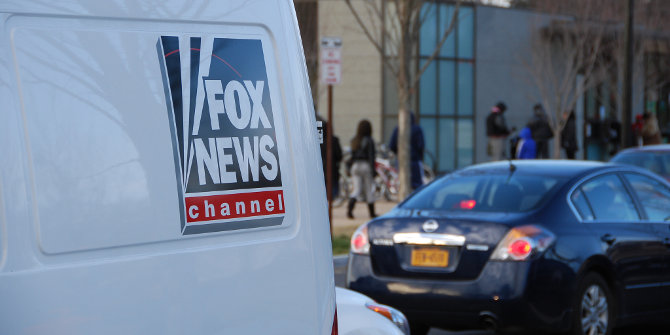

Hi John….great information and not too surprising when we look at some of the gaps in what we call Democracy. Keep up the contributions! Peace. Fr. Tom